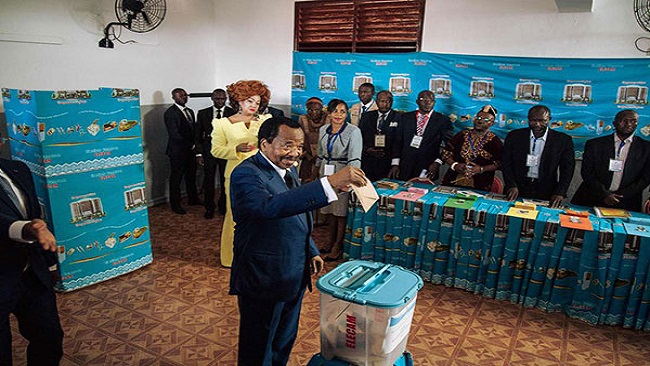Biya owes much of his survival to a longstanding relationship with various French gov’ts
On 6 November 2018, 85-year-old Paul Biya was sworn in for his seventh term as president of Cameroon, extending his 36-year rule. It is remarkable, more so considering that up to 60 per cent of the population is below the age of 25. It means that the vast majority of Cameroonians have never known a president other than Biya and have never lived through a truly free and fair election, where anyone other than Biya could win.
The question of longevity in office has been a focus for political organizing in many parts of the world since the 1990s, when one-party regimes fell apart – unable to sustain themselves after the Cold War. Many of the long-serving leaders of that era owed their survival to client relationships with the US and the Soviet Union. When the superpowers no longer needed them, there was finally enough space for democracy to take root. Only a handful of countries in Africa and Asia have resisted this transition, and the case of Paul Biya highlights why.
In crude terms, Cameroon was a second-tier state that was more interesting to secondary Western powers – namely France – than it was to either the US or the Soviets. Indeed, Biya owes much of his survival in power to a longstanding relationship with various French administrations. As such, despite the cloud of violence surrounding this latest election, France’s president Emmanuel Macron was one of a handful of leaders who congratulated Biya on his election victory in a letter (which Biya published on his Facebook page) that the Élysée claimed was supposed to remain private.
Nor have other nations made any tangible moves to distance themselves from Biya. Despite the mounting domestic resistance to his regime, particularly in the Anglophone region of the country, Biya travels the world freely. He frequents the InterContinental hotel in Geneva, where Cameroonians allege he spends more time than in Yaoundé. He regularly attends African Union Heads of State meetings and recently turned a three-day Africa-China summit in Beijing into a two-week trip.
When a president has been in power for 36 years in a country where elections should nominally change the leadership, it’s logical to ask, ‘Why aren’t the locals resisting?’ But in Cameroon, regional and international institutions do their best to nullify any local resistance. The army and the police have a nominal monopoly on the use of force and a relatively limitless access to weapons, training and other tools. And because the arms trade remains one of the least regulated industries in the world, after a while the only recourse left for those who resist is armed conflict, if the central state is unwilling to negotiate.
Thus, in 2015, citizens in the Anglophone region of Cameroon began a peaceful campaign to protest poor access to government services. That protest was met by violence from the army and the state, and has since morphed into a full rebellion. A secessionist campaign has been brutally countered by state violence and collective punishment of civilians. But this information is broadly kept out of the mainstream media by restricting access to the restive regions. By controlling how information about Cameroon is created and disseminated, Biya manages to shield the country from scrutiny, leaving Cameroonians to resist his regime by themselves.
Never-ending presidential terms are a hot topic right now in Africa, with the youngest population in the world, and in Cameroon, with a gap between an 85-year-old president and a population with an average age of 18.5, it looks particularly absurd. Biya’s Cameroon highlights that change is not just about sheer demographic numbers but power, violence and political institutions. Longevity is also a chance to ask important questions about the international systems that connect and sustain regimes around the world.
Source: New Internationalist




